Jesse Robb, Danya Taymor, Casey Likes and Brittany Bellizeare on the Power of Theater for Young People
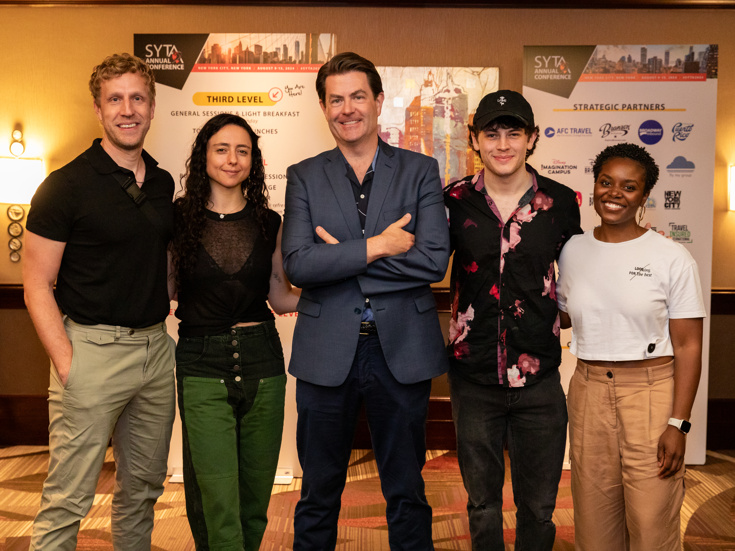
(Photos by Sergio Villarini for Broadway.com)
The Student & Youth Travel Association (SYTA), dedicated to providing life-enhancing travel experiences to students and young people, held their annual conference in New York from August 9 through 13 in New York City. On August 12, Broadway.com Editor-in-Chief Paul Wontorek moderated a panel for Group Sales Box Office at Broadway.com with three artists from the 2023-24 Broadway season—Danya Taymor, Tony Award-winning director of The Outsiders; Casey Likes, who plays Marty McFly in the musical Back to the Future; and Jesse Robb, co-choreographer of Water for Elephants—along with Brittany Bellizeare, soon to star in the world-premiere production of Ayad Akhtar’s McNeal.
In keeping with the interests and concerns of the SYTA, the panelists spoke about how theater, on Broadway and beyond, can enhance and enrich the lives of young people. They started by sharing their own formative theater experiences, both as theatergoers and as artists, with the attendees.
Back in 2005, Danya Taymor, aged 16, volunteered to drive a group of friends to see a production of Thornton Wilder’s Our Town, directed by Jonathan Moscone, at Berkeley Rep. “Act One happened,” Taymor said. “I was like, ‘Oh, this is so boring. I can't wait to get home.’”
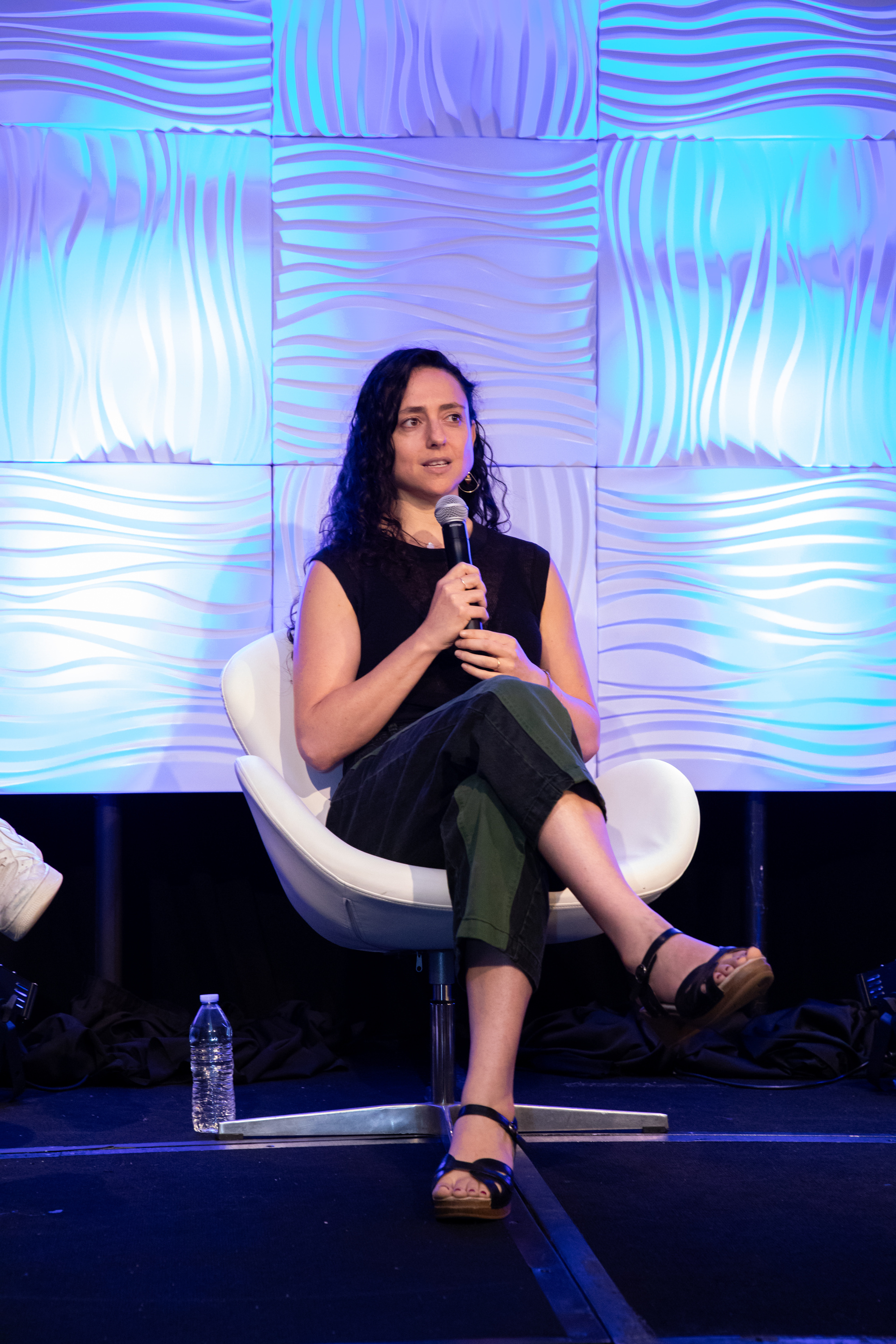
Act Three—in which the character of Emily Webb, who has died in childbirth, relives a day from her past and sees how little attention people pay to the beauty of life while they are living it—hit a little differently.
“I cried and cried,” said Taymor. “I was so touched by it.” Her companions, Taymor recalled, had to wait in the car for her “to get it together.” “It was an amazing experience—and it was a parallel experience of the character in the play that hit me, because I was close to her age.”
In 2019, Casey Likes, then aged 17, was cast as Jack Kelly in a production of Newsies at the Phoenix Theatre Company in Arizona. During the rehearsal period, Likes and his classmates took an excursion to New York City, where Likes saw his first Broadway musical: Beautiful: The Carole King Musical. “It was great,” said Likes. “We were hyped out of our minds to be in New York and to be seeing a Broadway show for the first time. It was just amazing.” That experience fueled that production of Newsies back in Arizona, said Likes. “We had all of this excitement to do this show after we’d seen all this Broadway talent.”
Jesse Robb was five when he saw a dance show at a library in Burlington, Ontario and told his parents—both progressive academics—that that was what he wanted to do. He found school difficult. “By the age of 10, it was very clear that I wasn't reading. I couldn't read and I couldn't write an essay by the time I was 11, 12, 13.” It was through the performing arts, particularly dance, that Robb was able to find his place in the world. “It became very clear to my mom that theater was the way that I understood how to construct a story and how to put a story together.” He was lucky enough to be exposed to Toronto’s “very, very lively” theater scene. “We often went as school groups to see shows in Toronto. A lot of Cameron Mackintosh: Les Misérables and Cats and the mega musicals of that time. It was a very memorable—very big experience. Going to see plays sort of became the thing that enabled me to learn how to put pieces of the puzzle together.”
In her senior year of high school, Brittany Bellizeare landed the role of Dorothy in The Wiz. She is the first to admit she hadn’t taken acting very seriously to that point. “I had no idea what I was doing,” she said. “I had never sung on stage in that capacity.”
But that role—and those profoundly emotional songs about home, family and inner strength—unlocked something. “The discovery of Dorothy and how she feels about home, how she feels about the people that she loves, how she feels about seeking something new and something real that she feels in her heart, really spoke to me. And it was crazy because I got so much feedback from teachers who had seen it. ‘Oh my god, you were so good.’ And I just didn't know I could do something like that. And that was when I was kind of like, ‘Oh, maybe I want to pursue this instead of math.’” In fact, Bellizeare did go on to major in math in college. “But that’s not the point,” she said. “I still pursued acting and here I am.”
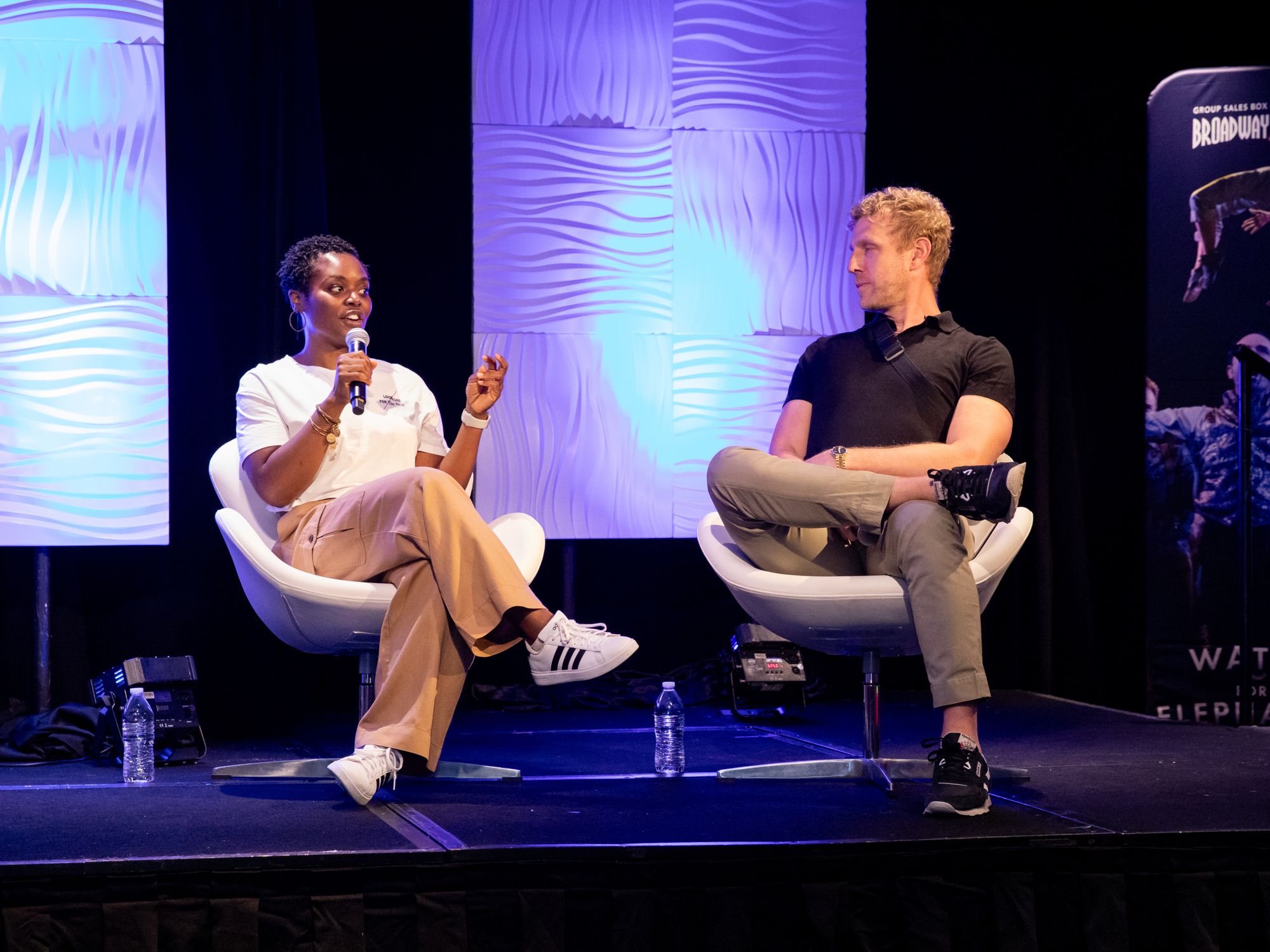
On the topic of exposing young people to the arts, Taymor shared a remarkable experience she had while working with a high school group in La Jolla that had established a connection with girls' schools in Kabul, Afghanistan. The two groups of students were engaged in a reading exchange: the American students were reading The Kite Runner while the Afghan girls were introduced to The Outsiders.
Taymor was invited to join a Zoom session with the Afghan students, “who are risking their lives every day to go to school.” (The Taliban prohibit girls from attending school beyond sixth grade.) During the session, one of the girls asked Taymor, "Why is it important to you that girls make things?"
“It was such a powerful question,” said Taymor. She told the students: “Well, the whole reason we’re all connected is because this 16-year-old girl wrote this book. Here we are talking about it. The work that you make matters. It actually can change people’s lives and make things happen.”
Still on the subject, Taymor—who studied both theater and global health at Duke University—recounted a study conducted by a group from her college that had traveled to Bolivia. The group created a program that provided students with access to various forms of art—music, sculpture, theater and more. The findings were striking: Students who had access to artistic activities were significantly more likely to excel in other areas, such as reading and math. The exposure to art, Taymor noted, was a catalyst for broader educational development.
(“Who wants to follow that up?” Likes deadpanned at this point. "The car flies," he tried. “I don’t know. Danya for president.”)
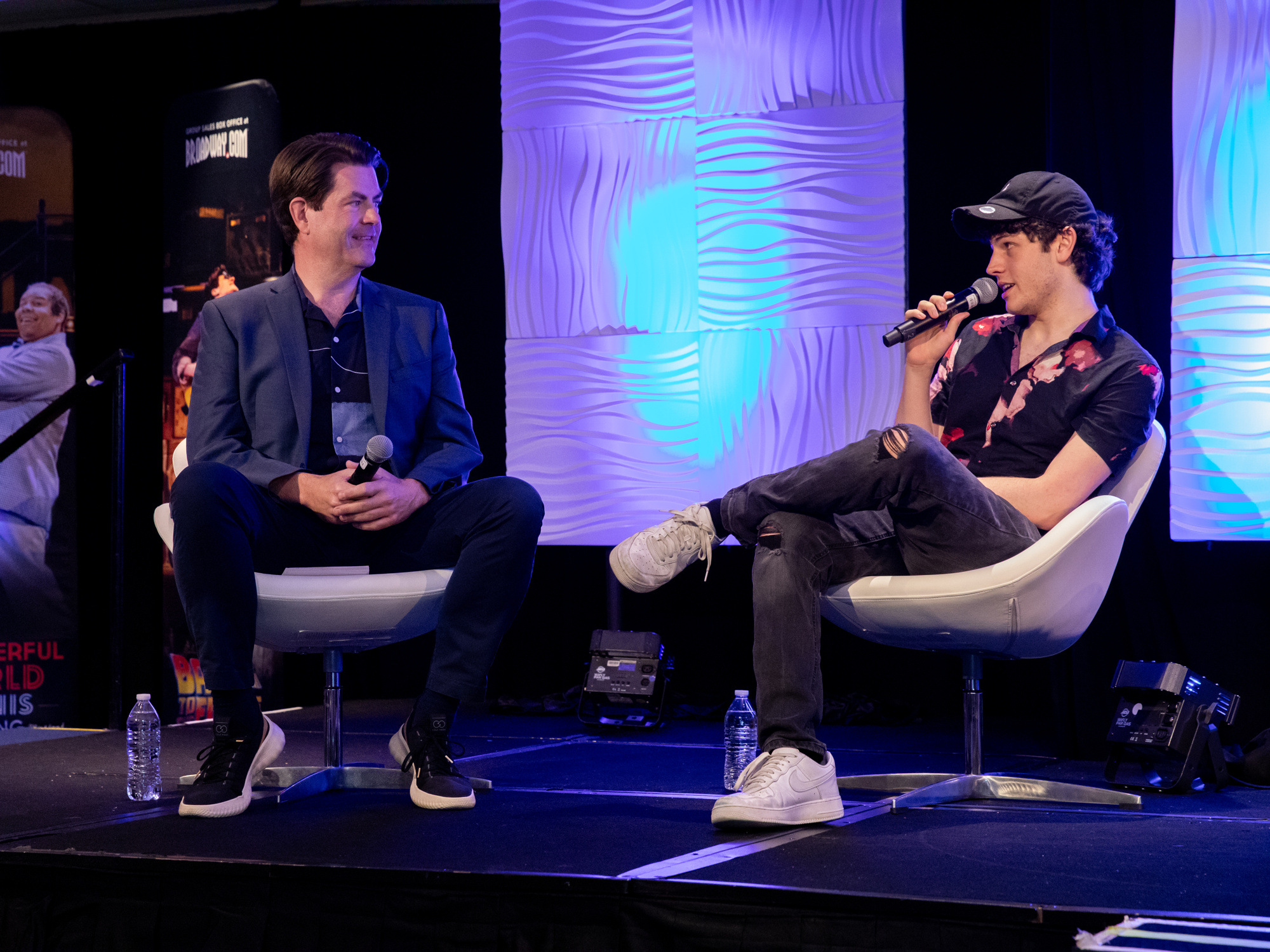
To conclude the panel, all four participants offered their thoughts on why their shows might resonate with younger audiences.
In its tale of a traveling circus, Water for Elephants, said Robb, is a deeply felt story of found family. “I have never met anybody who doesn't want to run away with a circus and who doesn't have that longing at some point in their life, who wants to basically escape and find home all over again,” he said. “You realize the power of this idea of running away and joining the circus and buying it as your home and what that means in this group of misfits and others that have also found an alliance in this sort of anti-typical home life and experience.” Plus: “Who doesn’t want to see flips?”
Back to the Future, said Likes, “is just a perfect gateway drug of a show”—before walking back the metaphor. “Sorry, I shouldn’t have worded it that way. Basically, it's a gateway show: There's big dance numbers, there's big special effects, there's amazing performances—mine excluded. And it’s so special to see the way kids react.”
McNeal is the story of a Nobel Prize-winning writer, played by Robert Downey Jr., who has an obsession with artificial intelligence. “One of the beautiful things that Ayad has captured in this play is just how, as a creative, to deal with things that come your way,” said Bellizeare. “Whether you feel like how you've interacted with people is a healthy way or not. I feel like McNeal, the character, uses his pain in a very creative way by writing books—but I think the youth can get a lot out of it. How to, instead of lashing out, actually use and incorporate pain in a way that is maybe artistic. Or maybe self-awareness can come out of it too.” Additionally, the production is going to be a technical wonder, featuring a “digital likeness” of Downey. “[It’s] going to be something that no one has seen on stage yet.”
As for The Outsiders, Taymor said, “Part of why it's so essential to bring young people, and especially students, to the show is because it's hard to be a young person. So much of the most devastating, tough stuff that ever happens to you happens to you for the first time before you're ready to deal with it. And the show explores what that's like. How do you survive? How do you not sink down or harm yourself?”
The Outsiders “shows you how it's so important to bring young people to something that doesn't try to sugarcoat it, because we know that life's tough, but you can get through it. There is a way through. There is a way out. Maybe that way is creating something. And so in that sense, in the world that we live in, it can be something both inspiring theatrically, but also healing for young people to experience.”
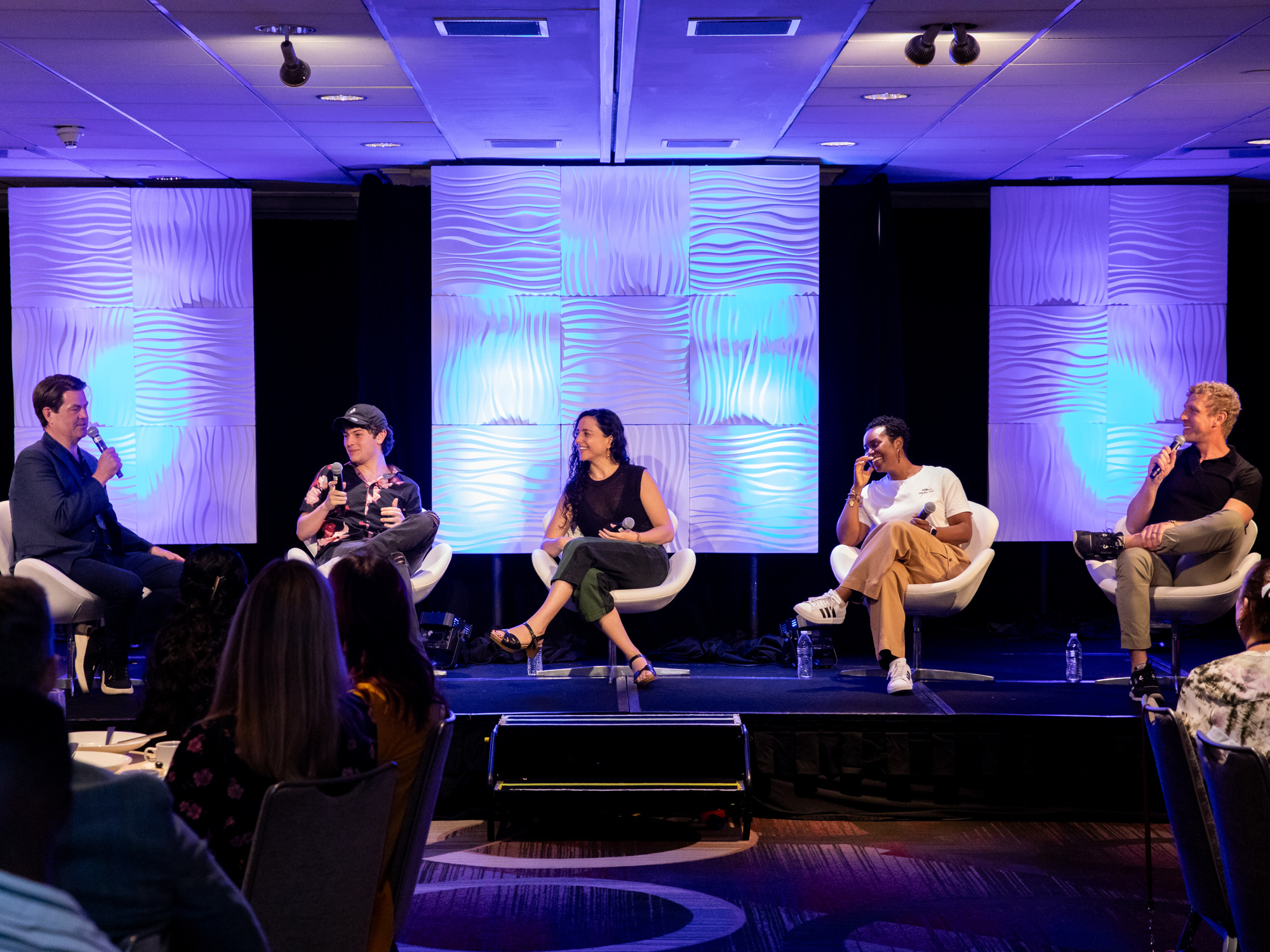
Related Shows
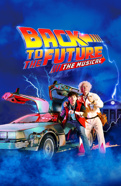
Back to the Future
Show Closed

The Outsiders

Water for Elephants
Show Closed

McNEAL
Show Closed
Star Files
Articles Trending Now
- 2025 Drama League Nominations Announced; Idina Menzel, Helen J Shen, Nicole Scherzinger, Lea Salonga and More Up for Awards
- Tony Winners Wendell Pierce and Sarah Paulson Will Announce 2025 Tony Nominations
- Redwood, Starring Idina Menzel, Will Release an Original Broadway Cast Recording in May; Debut Track Out Today

